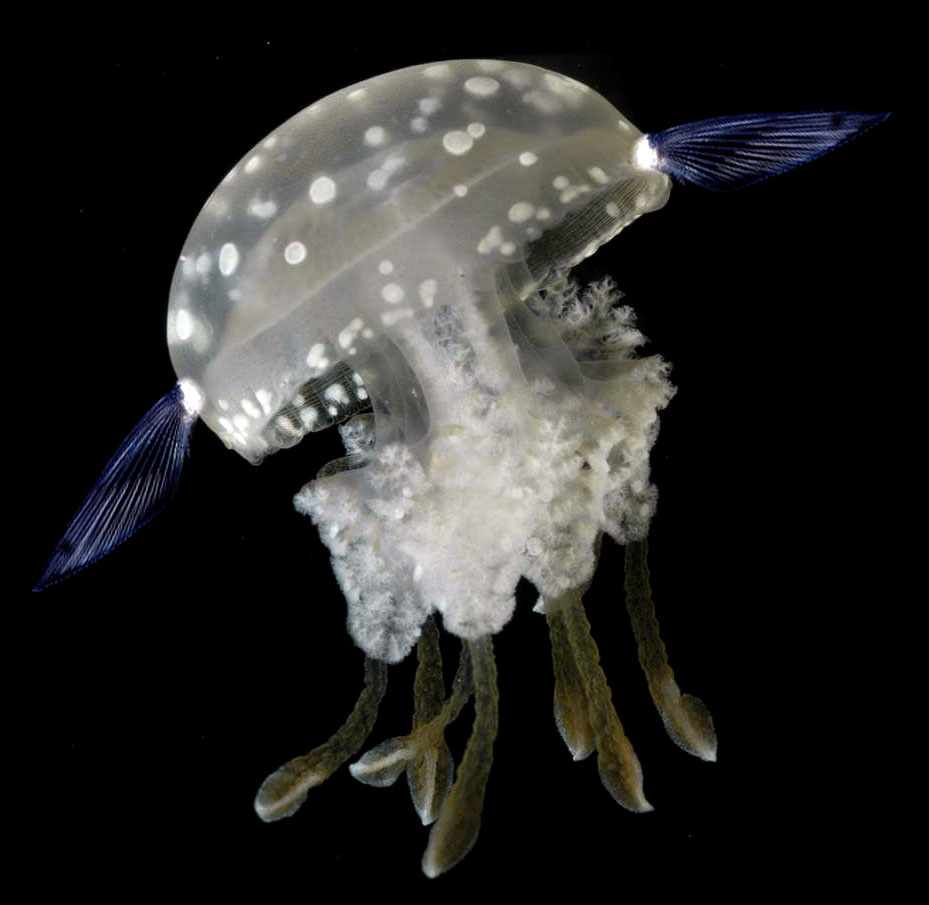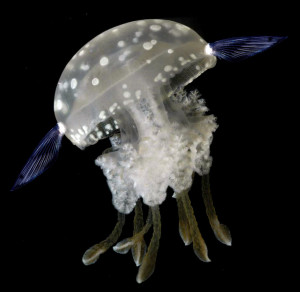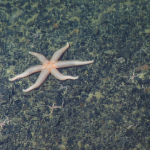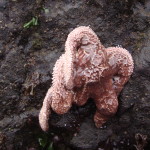Staring into one of the aquarium’s exhibits “I like these new Mastigias jellyfish”, I said, absently.
“Sea jelly”, my colleague corrected (with a certain smugness, I might add).
“I beg your pardon?” I replied.
“Sea jelly. They’re sea jellies now.”
“Oh, are they?”
“Yes, like sea stars.”
“I’m sorry?”
“Sea stars.”
“Jellyfish are like sea stars?”
“Sea jellies!”
“Jellyfish are like sea jellies? I thought you said they were the same thing?”
“No, no, no, sea jellies are like sea stars.”
“How do you figure that? One of them is all gooey and tentacular and such, while the other is sort of crunchy and has five arms that don’t much resemble tentacles at all”
*sigh* “NO! jellyfish became sea jellies and starfish became sea stars”
“Ah, I see….I think.”
“Good.”
“And…um…when did …when did this happen?”
“When did what happen?”
“When did invertebrates suddenly begin transmogrifying into other things?”
*quizzically* “Well they didn’t … change … exactly”
“They didn’t? I thought you said jellyfish became sea jellies. I’m pretty sure I remember your saying that. It was a pretty distinctive thing to say.”
“Well I did, but…”
“But what? Did they become sea jellies or not? I mean, I try to stay abreast of major changes in invertebrate systematics, and this sounds like something I should probably have heard about. Last I checked, jellyfish were still Phylum Scyphozoa”
“Sea jellies.”
“I’m sorry?”
“Sea jellies.”
“No, jellyfish are Scyphozoa. I’ve never even heard of sea jellies before just now, I have no idea what phylum they’re in.”
“No, no, they just changed the name, that’s all.”
“What?! Scyphozoa is no more???”
*gritting teeth* “No…jellyfish. They changed the name for jellyfish.”
“What, all of them??”
“YES”
“Wow, how’d I miss that?”
*ignoring me* “They changed the common name ‘jellyfish’ to ‘sea jelly’”
“Who did?”
“Who did what?”
“Who changed jellyfish to sea jelly?”
“Oh, well….um…I don’t know exactly. I…um…I just heard that somewhere.”
“You heard it?”
“Yes.”
“You heard it.”
“Mmhmm.”
“I see.”
“Yep.”
“And were these the same people who changed starfish to sea stars?”
“Er… I guess so, I don’t really know.”
“Seems important don’t you think?”
“What does?”
“Changing the commonly-accepted name for large groups of invertebrates. Seems like something someone in some sort of position of authority ought to be doing.”
“I guess.”
“And are they?”
“Are they what?”
“Are they in a position of authority?”
“Well, I don’t rightly know. I just…I read somewhere…”
“Why?”
“Why was I reading? What an odd question!”
“No, why did they change the name?”
“You mean jellyfish?”
“Yes”
“I think it was to reduce confusion”
*pause*
“ORLY?”
“I beg your pardon?”
“Nevermind. So you’re saying they changed jellyfish to sea jelly to reduce confusion?”
“Yes.”
“Confusion with what?”
“Fish.”
“Huh?”
“Fish.”
“People were confusing fish and jellyfish?”
“Yes. I mean … I guess. I don’t really know.”
“You don’t know the difference between a fish and jellyfish?”
*scowling* “Of course I know the difference!”
“Well, why change the name then? Was there a sudden epidemic crisis of taxonomic confidence among today’s youth?”
“A what?”
“Forget it. Look, we can’t have mysterious groups of anonymous people just going around changing the names of large groups of cnidarians just because T-Ball Nation can’t tell the difference between bilateral and radial symmetry”
“T-what?”
“T-Ball Nation. You know, Generation Text.”
“You’re a strange person, you know that?”
“Yeah, well at least I can tell the difference between a fish and a jellyfish”
“I KNOW THE BLOODY DIFFERENCE BETWEEN A FISH AND A JELLYFISH!!!”
“Good for you, but you really should try to calm down a bit, maybe…”
“I’m perfectly calm.”
“…consider decaf or, y’know, meditation.”
“I. Am. Perfectly. Calm.”
“Well OK there sport. Anyway, let’s go on to the next tank. I heard they’ve got some lovely sea cuttles…”








A lot of birders have a strongly-felt objection to the word ‘seagull’ (as opposed to just ‘gull’). And they will advance rational-sounding reasons why seagull is ‘incorrect’, but as far as I can see it’s actually just a shibboleth. Knowing that they’re really called ‘gulls’ allows you to pull rank over the little old lady feeding bread to the seagulls on Brighton pier.
This is delightful. Reads like something by P.G. Wodehouse.
It worked for the Tibetan ground
jaytit, but that’s a fairly obscure species.“Dreyfus once wrote from Devil’s Island that he would see the most glorious birds. Many years later in Brittany, he realized they had only been sea gulls… For me, they will always be… glorious birds.” – Harold and Maude
Sea cuttles, gotta remember that one.
Sea cuttles? I guess I better start changing all the names of my jewelry ;)
Thanks for the laughs.
Why stop there? We don’t want people confusing seahorses for mammals, now, do we?
This is a very funny exchange, and your friend was certainly asking for it with the smugness. Smugness and lording knowledge over others isn’t in the spirit of inquiry.
However, I personally don’t think it’s flippant to gently encourage a shift in common nomenclature. I work in public/outreach marine education and “starfish” = “fish” to many, many people simply because of the name.
Calling that thing in the touch tank a “sea star” (NOT SMUGLY) during interactions with the public prompts all kinds of interesting conversation about how we organize living things into categories, about some of differences between invertebrates and vertebrates, etc etc. It’s not a fish (because we, as a society have moved beyond “slimy and underwater” = “fish”) so why call it a fish?
Why shouldn’t the T-Ball nation have some sense of the difference between radial and bilateral symmetry? Why shouldn’t that be common knowledge?
I still prefer “flying lemur” to colugo. The utter wrongness is a feature not a bug.
As usual, Ed Yong has it exactly right.
Really there is only so much you can do to affect how us regular folks talk. Personally, I’ll believe there’s a dinosaur called Brontosaurus till the day I die.
When I say my kids love to eat kiwi, the Aussies all scoff at me and tell me my kids like to eat large, flightless, hairy birds.
Apparently, it’s kiwi fruit. But I am a U.S. American (Gen X) and can’t be bothered with extra syllables.
The problem is, that change leads to thousands of others on a slippery slope that results in far more confusion than would ever be solved; you’re better off explaining the difference between fish and jellyfish in the first place. As one commenter observed, seahorses are not mammals. Similarly, catfish are not cats any more than jellyfish are fish, do we change their name? What about dogfish (which is technically a shark anyway), goatfish, cowfish, batfish, ratfish? The prefix “sea-“ as in “sea jelly” and “sea star” doesn’t really help a lot. The sea raven is not a crow and there is no ink in a sea pen, although there is in a sea hare, which is not a rabbit (neither is the rabbit fish) but rather a mollusc like the flamingo’s tongue, which isn’t a bird (neither is the peacock shrimp, peacock bass, peacock wrasse, hawkfish, parrot fish, or the sea robin).
Frankly, attempting to mandate changes in common names is a futile exercise. People will call animals what they call them, where they call them that, and there is NO right or wrong common name for anything. What is called a bluefish in America is a chopper or tailor in Australia, where a jack is called trevally, what’s called jack is a snapper, what’s called snapper is a porgy, most porgies are called bream, a grouper is called a cod and so is the largest freshwater fish, even though it is neither grouper (serranid) nor cod (gadid) but in a group of its own.
The only way to resolve name ambiguity is through scientific nomenclature (even that doesn’t help sometimes – ask any taxonomist!). Common names will always be drawn from simile, flavoured with a dash of historical context and a healthy dose of local vernacular. It can’t be dictated and nor should it be IMO, since the diversity of common names results in a far richer and more satisfying smorgasbord of original and descriptive proper nouns. I say leave disambiguation to the taxonomists and go on and call them jellyfish if you like. Do it proudly!
jellyfish or sea jelly… they still taste like rubber bands.
To me, the larger philosophical point is to instill appreciation of the natural world in the general public, not to inundate them with minutiae – and certainly not to feel smug (whether intentionally or not). Common names go a long way with connecting people with organisms. It uses the available language instead forcing them to learn and remember near language.
We can’t, nor shouldn’t, expect everyone to be 100% accurate with scientific terminology. That is an unfair burden. I would much rather spend my time connecting people with nature so that when the choices are made they always keep in mind the natural world as a stakeholder in their actions.
Well, Aussies also use “kiwi” to refer to anyone from New Zealand, so it does rather sound like your kids have developed cannibalistic tendencies! As an expat Aussie I had a similar problem when I came to America and heard people rooting for the home baseball team; which is an altogether different visual to your average Australian! (lets just say it’s definitely past third base…)
I had to look those up. I bet they make great chicharrones.
Well, I think resolving confusion over names can be an opportunity to educate and instill appreciation. I’ve often discussed with a guest or ecotourist that a whale shark is a shark and not a whale and that they get that name because of their ecological similarities with baleen whales (size, filter feeding). I think the message really sticks precisely because there was ambiguity that needed resolving.
So is a whale shark a shark or a whale? And what about the Vampire Squid?
“Well, I think resolving confusion over names can be an opportunity to educate and instill appreciation.”
This is exactly it. When I give presentations I hold up an organism I was taught to call a “Northern sea star,” and call it as such. If someone asks “Isn’t that a starfish?” I respond with “That’s another common name for this kind of organism, yes! Often organisms have many common names…” and it goes from there. If no one asks, no problem. I’m not interested in mandating the common language, or in correcting anyone. I chose to use language I think is clear and connects with what I’m try to convey.
I think my personal feelings on the matter come from a very meaningful, initially hostile (!!) exchange I had with an 8th grade science teacher at the aquarium. He was indignant that I used “jelly” instead of “jellyfish” because he KNEW they were fish, because why else would they be called that?! I was able to get onto the common names track pretty quickly, and discuss how many things were first called “fish” just because they lived in the ocean. The students helpfully started piping up with all kinds of examples of animals and plants with funny, comparison names and it turned out great.
I guess I continue to drop “-fish” where I think it’s a common source of confusion in hopes of prompting these very sorts of discussions.
this whole thing would have had much more “street cred” to it if Para Sight didn’t call Scyphozoa a Phylum…. Phylum Cnidaria-Class Scyphozoa that’s ultimately what this silly thing was all about yah?
Ya got me! I sometimes forget where I am in the whole “Kinky People Can Often Find Good Sex” scheme.
“Mantis shrimp aren’t really shrimp.”
“Wait, what the hell is a shrimp anyway?”
http://arthropoda.southernfriedscience.com/wp-content/uploads/2011/10/shrimps.jpg
“Shit.”
Help! Help! I’m being re-named!
I had once written a post on saber-tooth cats and the differences between them and nimravids. I made the mistake of referring to them as “tigers,” because that is how I had always known them. The one comment on my blog was to scold me.
It kind of hurt that the commenter hadn’t commented on the remainder of the post.
“A jellyfish by any other name would sting as painfully.”
for that matter, the barnacle goose doesn’t really come from barnacles now does it?
Yeah, I grew up with them being called Sabre Tooth Tigers too. And well, tigers are cats – though very specific cats, I still think its redundant.
That is AWESOME and I am using it to introduce pelagic arthropods in my zooplankton lecture today.
I am laughing so hard I can’t think of an intelligent comment.
Come see the ambiguity inherent in the system!
This is hysterical. I agree with Jenn, the last poster of words…I am silly with peals of laughter! Thanks for sharing the humor about nomenclature!
Dogfish? You mean Hound Shark, right? like Hound Shark Head Ale?
Even more confusing, a lot of so-called saber-tooth tigers/cats werent even cats; some were marsupials!